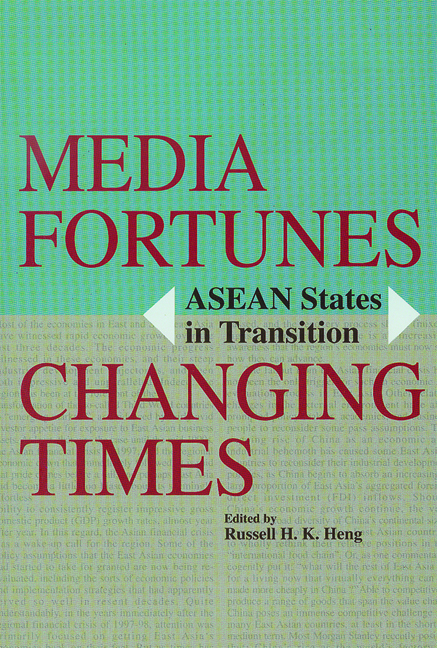Book contents
- Frontmatter
- Contents
- Foreword Wolfgang Möllers
- Acknowledgements
- Contributors
- Introduction
- Chapter 1 Media in Southeast Asia: A Literature Review of Post-1980 Developments
- Chapter 2 Cambodian Media in a Post-Socialist Situation
- Chapter 3 Industrialized Media in Democratizing Indonesia
- Chapter 4 Indonesian Television and the Dynamics of Transition
- Chapter 5 The Impact of Economic Transition on the Media in Laos
- Chapter 6 The Media and Malaysia's Reformasi Movement
- Chapter 7 Myanmar Media: Meeting Market Challenges in the Shadow of the State
- Chapter 8 Singapore: Media at the Mainstream and the Margins
- Chapter 9 Offending Images: Gender and Sexual Minorities, and State Control of the Media in Thailand
- Chapter 10 Vietnamese Media in Transition: The Boon, Curse, and Controversy of Market Economics
- Index
Chapter 7 - Myanmar Media: Meeting Market Challenges in the Shadow of the State
Published online by Cambridge University Press: 03 November 2017
- Frontmatter
- Contents
- Foreword Wolfgang Möllers
- Acknowledgements
- Contributors
- Introduction
- Chapter 1 Media in Southeast Asia: A Literature Review of Post-1980 Developments
- Chapter 2 Cambodian Media in a Post-Socialist Situation
- Chapter 3 Industrialized Media in Democratizing Indonesia
- Chapter 4 Indonesian Television and the Dynamics of Transition
- Chapter 5 The Impact of Economic Transition on the Media in Laos
- Chapter 6 The Media and Malaysia's Reformasi Movement
- Chapter 7 Myanmar Media: Meeting Market Challenges in the Shadow of the State
- Chapter 8 Singapore: Media at the Mainstream and the Margins
- Chapter 9 Offending Images: Gender and Sexual Minorities, and State Control of the Media in Thailand
- Chapter 10 Vietnamese Media in Transition: The Boon, Curse, and Controversy of Market Economics
- Index
Summary
INTRODUCTION
As in any other country, the media — encompassing the print, broadcast and electronic versions — has played an important but ill-defined role in the interface between state and society in Myanmar. This role is influenced by the social, economic and political environment. Advocates of liberal democracy have argued at length about the importance of press freedom. Nevertheless, in practice the best that can be achieved is perhaps a form of embedded autonomy within the social milieu in which the media operates. As such, one should avoid “extracting and reifying” the media into a monolithic “institution” that stands apart from the “host society”. The extent to which media act as a communication “medium” is largely determined by the groups that have control over them. In the case of Myanmar, this control has been the state's prerogative for nearly four decades, since the military coup of 1962.
Some discussion of the changing social, economic and political settings, as well as the evolution of the Myanmar media in a historical perspective, is also necessary in order to be able to appreciate the complexities underlying the current challenges faced by the media and the latter's attempt to cope with them.
MYANMAR STATE AND SOCIETY
Myanmar is a multi-racial, multicultural and multi-religious society. The political system of Myanmar has changed four times during the twentieth century. In 1948 it changed from a British colony that allowed limited “home rule”, to a parliamentary democracy system along the lines of the Westminster model. After the military coup of 2 March 1962, the military Revolutionary Council (RC) ruled Myanmar by decree. The RC formed the Burma Socialist Programme Party (BSPP) in July 1962 and, after drawing up a new state constitution that instituted a one-party socialist state in January 1974, it handed over power to the BSPP. From early 1974 until the coup of 18 September 1988, a one-party socialist system under the regime was in place. This system changed when a military junta named the State Law and Order Restoration Council (SLORC) took power through a coup on 18 September 1988. The junta holds executive and legislative powers while devolving judicial authority to the courts of law after initially exercising martial law.
- Type
- Chapter
- Information
- Media Fortunes, Changing TimesASEAN States in Transition, pp. 139 - 172Publisher: ISEAS–Yusof Ishak InstitutePrint publication year: 2002



